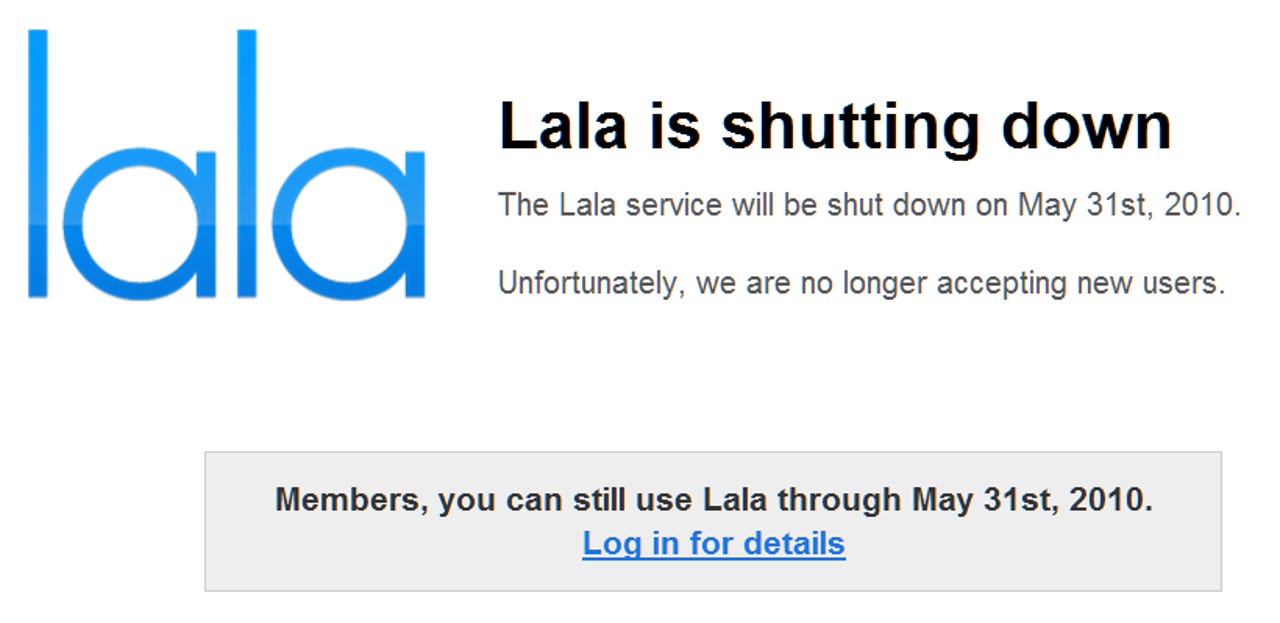How Apple used its money and muscle to kill an iTunes competitor

Remember Lala.com?
Back in 2009, it was the single brightest spot in the online music universe, with an innovative service that allowed customers on any platform to preview songs in full, for free, and a "music match" capability that scanned your library and gave you full online access to your collection from any PC or Mac. It also sold music, at prices that consistently undercut those in the iTunes store.
I raved about Lala in my April 2009 report, 6 music services compared: Who can bust the iTunes monopoly? But I was also concerned about the company’s future.
Given the level of competition, any music fan has to wonder whether Lala can survive in the long term. I hope they do. At the very least, I hope some of the big competitors can start to think as creatively as this upstart.
That wasn't an idle concern, as it turned out. Apple bought the company in December 2009, and all signs of innovation stopped immediately. In April 2010, the company announced it was ceasing operations for good.

Readers accused me of being paranoid when I speculated that Apple bought the company just to kill a competitor. Here's what I wrote:
So why did Apple buy Lala? Apple has declined to comment despite repeated requests, so I can only speculate. It might have been because they wanted the developer talent, or because they wanted to slow down Lala's momentum and keep a competitor like Microsoft from buying the company. But given the non-portability of Lala's contracts and the robust growth of the iTunes Store, it's highly unlikely that Apple is going to do anything to discourage iPod/iPhone/iPad owners from purchasing tunes.
Now it turns out that's exactly what happened.
Lala was founded by Bill Nguyen, who went on to found Color. Both companies were purchased by Apple. Aubrey Johnson, a designer who worked with Nguyen at Color, wrote a blog post a few days ago in which he spilled the beans about the Lala deal. The post has since disappeared, with no explanation, but not before it made it into search engine caches. (Sorry, @aub, the Internet never forgets.)
Here's what Johnson wrote:
Lala struggled through pivot after pivot in the music industry, buying digital radio stations, a CD swapping business and finally streaming music.
Amongst its struggles, Lala did have an interesting success. In 2009 when you Googled a song, the first result was a Lala result. Not an iTunes result, not the artist’s MySpace or website ... a Lala result. Every click that led to Lala wasn’t leading to iTunes for a potential music purchase. Even worse for Apple, Lala was often a better deal. When Lala partnered with Google (for Google's Music Beta) there was a clear and present danger to Eddy Cue and his iTunes empire. Nguyen had pure gold and started a bidding war for the control of the company.
Nokia reportedly offered $11 million for Lala, an amount that "disgusted" Nguyen, according to Johnson. So Nguyen called Google.
Google was worried, they moved fast. They presented Nguyen with an offer for the company. Previously, Bill told M&A from Google what it would take to acquire the company. Instead of meeting his demands they decided (via a lowball offer) to see if Nguyen was desperate or bluffing. Bill made his next move.
He called in a few favors and got a meeting with the leadership at Apple. He explained that he had offers from the largest mobile OS competitors and that they wanted to acquire his music startup. Cue knew if Google obtained Lala the ownership of the service coupled with search dominance could be disruptive to their stronghold. Bill was notorious at getting great deals with the music elite, usually through Lala's investor, Warner Brothers Music.
Google's stupid negotiating led to this result:
Apple successfully acquired Lala for roughly $80M (purchase price) with an additional $80M in retention bonuses for the remaining employees valuing the entire deal around $160M.
No, Apple didn't want the technology. It didn't even want the people behind the company:
The ultimate irony in this story is that quite a few notable members of the Lala-to-Apple team followed Bill through the door and onward to his next venture. They left millions in options at a the $196.48 exercise price they had from the 2009 sale/retention bonuses. Some of those same engineers returned to Apple in the highly covered rumor that 20+ engineers went to Apple for $7M.
Meanwhile, it's 2013 and Apple still doesn't have a music streaming service. You can listen to longer previews on iTunes but still can't play a track in full as you could with Lala. Apple did eventually introduce iTunes Match, but that service requires a subscription fee and isn't an open, browser-based solution like Lala's.
What a shame.